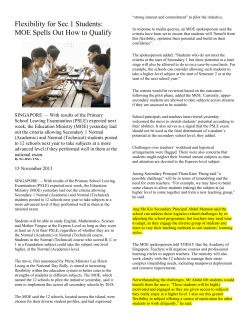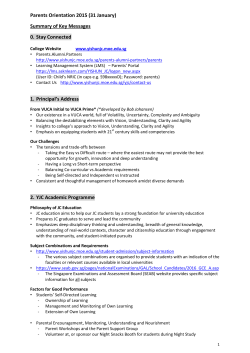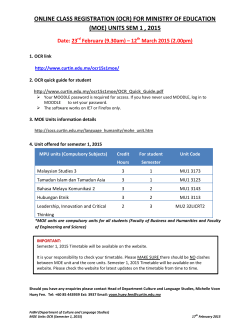
"Er det nødvendigt at digitalisere forretningen?" v/ Adam
Er det nødvendigt at digitalisere forretningen? Adam Osbirk Moe, Capgemini Sogeti Adam Osbirk Moe, Capgemini Sogeti Digitaliserings potentiale 26% Større fortjeneste 12% Markedsværdi 9% Større indtjening © CapgeminiSogeti 2 Overskrifter © CapgeminiSogeti 3 Hvem er jeg? Adam Osbirk Moe Portaler og digitalisering siden 2000 Web projektleder i organisation og finansiel sektor MBA, IT, Kommunikation og Organiation © CapgeminiSogeti 4 Capgemini og MIT Universitetet arbejder sammen © CapgeminiSogeti 5 DIGITAL INTENSITY Indtægt Udbytte Digital transformation – kan det betale sig? Markedsværdi Fashionistas Fashionistas Digiratis Digiratis -11% -12% +6% +26% +12% +9% -24% -4% -7% -10% +9% +7% Beginners Beginners Conservatives Conservatives TRANSFORMATION MANAGEMENT INTENSITY © CapgeminiSogeti 6 The Startups are coming © CapgeminiSogeti 7 Startups er på vej © CapgeminiSogeti 8 Digital Disruption • Rita Gunther McGrath, a professor at Columbia Business School, who is a globally recognized expert on strategy in uncertain and volatile environments. “It is important to understand that most digital disruptions don’t happen suddenly. They take place over time,” she explains. “Most companies often get so caught up in everyday operations that they don’t take a step back to think about what the future might hold.” • Philippe Lemoine, who recently authored a report for the French government on the digital transformation of the country’s economy, outlines three factors driving disruption: automation, dematerialization (substitution of physical products and processes with digital alternatives) and changes to the value chain. • Rachel Botsman is a global thought leader on one of the emerging business models of the disruptive segment: the collaborative economy. “The collaborative economy drives a shift from centralized asset-heavy organizations to decentralized asset-light networks and marketplaces,” she explains. “It typically does this by creating business models that enable underutilized assets - from spaces to skills to “stuff” - to be used more efficiently.” She believes there are five key drivers of disruption – wastage of resources, redundancy, complexity, limited access and broken trust. Each of these areas creates new opportunities for startups and incumbents alike. © CapgeminiSogeti 9 Startups vokser smidigt & hurtigere © CapgeminiSogeti 10 Modsvar til digital disruptive © CapgeminiSogeti 11 Et dansk eksempel © CapgeminiSogeti 12 Spørgsmål? Adam Osbirk Moe Adam-osbirk.moe@capgemini.com Mobil: 52189557 13
© Copyright 2025









